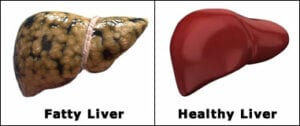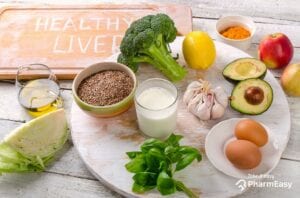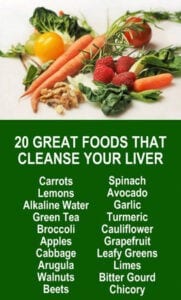What is Fatty Liver Disease
Blue indicates link

- Fatty liver happens when fat builds up in the liver. Having small amounts of fat in your liver is normal, but an excessive amount of fat can cause damage to your liver and therefore your chances of getting ill are greatly increased.
Your Liver
The liver has many functions. These include converting food into energy, filtering harmful toxins, it makes proteins that help the grume (blood clotting) which controls bleeding and it also produces bile, which helps in digestion. The liver could also be an important digestive organ that converts nutrients from the food we fret essential blood components. Your liver assists in storing minerals and vitamins by producing critical proteins and enzymes that help hormonal balance within the body. The liver helps the system fight infections and removes microorganisms from the bloodstream. It also produces bile which is important for digesting fats in our diet.
- Detoxification is one of the liver’s most essential functions. The liver is our body’s greatest filter. It clears harmful toxins while helping to obviate waste and retains essential nutrients that the body needs. The nutrients are then converted into essential blood components.
- The liver is additionally responsible for metabolizing fats, proteins, and carbohydrates. The liver also balances hormones. The liver helps oxidize triglycerides to produce energy. It also produces bile which is important for digesting and absorbing fats in our diet. The liver makes sure your blood glucose levels remain constant, its dual purpose is to get rid of sugars and store sugar. When sugar levels get low the liver will then release the stored sugars. Amino acids are converted into protein for energy.
- The liver supports your immune system. It regulates and directs hormones. With these many functions, it’s critical to guard the liver from disease.
- NAFLD: nonalcoholic fatty liver disease
- NASH: This means you have inflammation of the liver (not caused by the overconsumption of alcohol)
-
What Your Liver Does For You
- Eliminates toxins from the body, like environmental pollutants, food additives, dead cells, alcohol, etc.
Produces bile, which helps take away waste and break down fats
Stores and releases glucose for energy
Clears the blood of harmful substances
Resists infections by removing bacteria from the bloodstream
Clears bilirubin (if there’s a buildup of bilirubin, the skin and eyes turn yellow)
Regulates glucose, vital signs, blood glucose, insulin, estrogen, testosterone, the system, and blood cholesterol
production.
The Liver Health Nutrition Plan:

Consider removing these types of foods to maintain better liver health. Processed and refined foods and common food sensitivities such as soy, gluten, corn, pasteurized dairy, and peanuts should be avoided.
Mycotoxins are found in foods such as cereals, nuts, spices, legumes, dried fruits, apples, and coffee beans, often under warm and humid conditions should be taken in moderation.
It is always a good idea to refrigerate your foods and stick with organic products. Try to eat and drink certified organic and chemical-free products. This is also true for personal hygiene products and household cleaning agents. Exposure to toxins in the environment and the water you drink are also essential to keep in mind for good overall health.
Best Diets For Fatty Liver Disease
Foods that are beneficial to liver health include those that are rich in B vitamins, vitamin C, and trace minerals. These foods are found in raw vegetables like celery, spinach, cucumbers, and romaine lettuce. Juicing your vegetables is a healthy choice for better nutrient absorption. Berries and citrus fruits are healthy choices to promote liver health.

The use of herbs such as ginger, milk thistle, cilantro, watercress, wormwood, mint, horseradish, sorrel, radish, peppermint, parsley, dandelion, coriander, garlic, and turmeric are also considered great for liver health. We will get into some juicing recipes later on using spinach, celery, cucumber, lemon, ginger kale, cucumber, parsley, celery, and lime for both liver and kidney health.
You can gain nutritional value from eating organic liver itself. Most pasture-raised animals are grass-fed, such as chicken and, beef. Eggs from chickens raised on these types of farms are everything natural and organic.
Anti-Inflammatory, Ketogenic Diet
One of the best strategies for preventing and healing fatty liver is to consume an anti-inflammatory, ketogenic diet.
Food to Avoid
Avoiding sugar is critical for liver health. Farmed fish, conventionally raised animals and dairy from them often contain toxins that could cause inflammation and therefore they should be avoided.
Foods to Include In Your Diet
An anti-inflammatory diet includes whole, unprocessed foods. This diet consists of clean protein, organic vegetables and fruits, and healthy fats.
Vegetables such as leeks, shallots, cucumbers, asparagus, and leafy greens are low- low-carbohydrate and liver-friendly.
Berries, grapefruits, limes, lemons, and granny smith apples are all low-glycemic fruits.
You should also include plenty of liver-healthy herbs.
Quality fats are a really important part of a liverhealthy diet.
Quality Fats are found In:
Avocados
Olives
Great for Liver Health:
Brussels sprouts
Kale
Broccoli
They help neutralize toxins within the liver with their abundant amounts of phytonutrients, carotenoids, and flavonoids. Avocados are a superb source of glutathione which is required by the liver to filter harmful substances and protect liver cells from damage. Also, consider adding beets and leafy green vegetables to your diet.
Also Great for liver Health:
Citrus Fruits
Grapefruit
Limes
Lemons
Cranberries
Blueberries
Avocados
Coffee
Green Tea
Olive Oil
Fatty fish like salmon are known to protect the liver from NAFLD and NASH.
Coffee features a protective effect against the event of cirrhosis of the liver. Coffee is even related to a lower risk of death in people with chronic diseases. Green tea and vegetable oil may improve liver enzyme levels and reduce oxidative stress and fat accumulation within the liver
Spirulina and Chlorella are rich in vitamins, protein, antioxidants, and minerals. These algae support and enhance immune function and should protect the liver against damage. Spirulina is taken into account as an efficient treatment for people with NAFLD. Chlorella’s tough outer cell membrane binds with heavy metals and other toxins to hold them out of the body.
Hydration
Hydrating with clean, filtered water is vital for a healthy liver. Water is great for the body. Water improves oxygen delivery to cells, flushes out toxins, transports nutrients, and supports the body’s natural healing processes.
Optimal hydration is critical for healing the liver. To be hydrated, you ought to consume a minimum of one-half and up to your full weight in ounces of water a day.
How much Water Should You Drink
Herbs For Better Liver Health
Milk thistle:
Milk thistle has been used for over 2,000 years to treat bile duct and liver conditions and research shows that it may have liver-protective properties
Ginseng:
Help protect against liver injury caused by viruses, toxins, and alcohol. Plus, it may boost liver cell regeneration after surgery
Supplementing with green tea extract may help treat those with liver disease.
Licorice:
Licorice root has been shown to have anti-inflammatory, antiviral, and liver-protective
Turmeric:
Has powerful anti-inflammatory, antioxidant, and anticancer properties, which makes this herb a popular choice for those with liver disease
Garlic:
Garlic contains numerous sulfur-containing compounds that activate the liver enzymes responsible for flushing out toxins from the body.
Ginger:
Commonly used as a medicinal treatment for many health conditions, including liver disease.
Ginkgo biloba
Ginkgo biloba injections reduced liver fibrosis and enhanced liver function
Astragalus:
Always consult with your doctor before using herbal alternatives
Healthy Liver Food Tips
- Pick out vegetables and fruits without high-calorie sauces or added salt & sugars
- Choose fiber-rich whole grains
- Pick up poultry and fish without skin prepared in a healthy way
- Decide over lean cuts of meat instead of those high in fat
- Eat fish at least twice a week, especially fish containing omega-3 fatty acids (e.g. salmon, trout, and herring)
- Make sure your dairy is Fat-free (skim) or low-fat (1%)
- Avoid foods with partially hydrogenated vegetable oils to reduce trans fat
- Limit saturated fat and trans fat by replacing them with better fats (monounsaturated and polyunsaturated)
- Cut back on beverages and foods with added sugars
- Choose foods with less sodium and prepare foods with little or no salt
Foods That Are Good For Your Liver
Oatmeal
Food with lots of fiber can help your liver work at its best.
Could stop the accumulation of fat in the liver, protecting against NAFLD.
Almonds
Helps protect against fatty liver disease. Almonds are good for your heart, too, so grab a handful the next time you feel like snacking.
Are good sources of vitamin E, a nutrient that research suggests may help protect against fatty liver disease.
Leafy greens have a powerful antioxidant called glutathione, which can help keep your liver working right.
Herbs and Spices
Sprinkle on some oregano, sage, or rosemary. They’re a good source of healthy polyphenols. An extra benefit: they help you cut back on salt in many recipes. Cinnamon, curry powder, and cumin are good ones to try, too.
Drink Coffee
People who drink a few cups of coffee a day may be less likely to get liver diseases including cancer and scarring (fibrosis, cirrhosis).
Conclusion
The liver is the body’s most hardworking organ. It plays a critical role in many bodily functions, including regulating digestion, metabolizing fats, carbohydrates, and proteins, and removing harmful particles and chemicals from the body. When the fat in the liver makes up over 5% of the liver’s weight, a person has fatty liver disease.
The two main types of fatty liver disease are alcoholic fatty liver disease and nonalcoholic fatty liver disease (NAFLD).
Alcoholic fatty liver disease is caused by excessive alcohol intake. NAFLD is the most common liver disease. It is associated with obesity, type 2 diabetes, insulin resistance, and many other conditions. Often there are no symptoms associated with NAFLD. Over time, symptoms can develop such as fatigue, weight loss, loss of appetite, pain in the center or right upper part of the belly, nausea, and jaundice. When a person has fatty liver with liver inflammation and liver cell damage, it is called nonalcoholic steatohepatitis (NASH). NASH can cause a dangerous condition called cirrhosis of the liver.
There are natural strategies for healing the liver. Following an anti-inflammatory, ketogenic diet incorporating foods and herbs that support liver health is critical. You should avoid refined sugars, alcohol, processed foods, trans fats, factory-farmed meats and dairy, farm-raised fish, and GMO foods. Eat organic whenever possible to avoid chemicals such as herbicides or pesticides.
Other natural healing strategies for liver health are intermittent fasting, drinking optimal amounts of clean, filtered water, and adding liver-supporting nutrients. Reducing stress, improving sleep, taking Epsom salt baths, using castor oil packs, and dealing with your anger in healthy ways can support liver health. Improving gut health, supporting stomach acid levels, and optimizing bile flow are also important for healthy liver function.
Liver disease is on the rise in the United States according to statistics compiled by the CDC. Death rates from liver cancer increased by 43 percent for U.S. adults in the period 2000 to 2016. Each year about 22,000 men and 9,000 women get liver cancer, according to the CDC.
Thank you for reading
Michael
Comments are welcome
Hi there. I was just having a look at your website and article here. I found it very interesting indeed. Its great to see so much health information online nowadays which should hopefully give us all a higher standard of life in the long run so well done and good luck with future articles.
Hi Kwidzin,
Thank you for your comments. You are absolutely right, there is a lot of health information out there. It is up to us to become familiar with them to maintain a healthy lifestyle.
All the best,
Michael